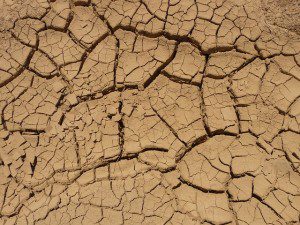Parched
Psalm 63:1-8, Isaiah 55:1-9
How many of you have ever been to Hawaii? If you have, you will know that homes in Hawaii are generally unairconditioned. The reason for this is that usually there is always a breeze called a trade wind blowing across the islands off the ocean. Even in the hottest weather, when the trade winds are blowing, you’re generally comfortable. If not, then, you just go to the beach and jump in the ocean.
No need for AC is pretty standard on the island where I grew up, Oahu…except for the western side of the island. On that side of the island the trade winds don’t often blow; the land is largely red packed dirt; and it’s very, very hot. Perfect, as it turns out, for growing pineapple.
 I was not thinking about this silver lining, however, when, during my freshman year of high school I had to run 7 miles on a route out in the western part of the island.
I was not thinking about this silver lining, however, when, during my freshman year of high school I had to run 7 miles on a route out in the western part of the island.
Those of you who know me well can probably guess that running is not something I do often, and certainly not for fun. I was running because I went to a high school for students of Hawaiian decent, and obesity and heart disease is extremely common among native Hawaiians. Someone had come up with a plan to make training for and running 7 miles a requirement for passing 9th grade. The intent, I suppose, was to birth a love of exercise.
Fail.
We trained all semester, and finally the day of the run came. They took us out to the west side of the island and run we did. In the hot, beating down sun. Over the red dirt. With no trade winds. I have many memories from that experience, but the most clear memory that pops to my mind when I think of that day is how very thirsty I was. I can still feel my tongue sticking to the roof of my mouth, sweat running down my brow, throat almost closing up with all the dryness. I can also remember the feeling of crossing the finish line and gulping down a cup of water; maybe the most delicious memory ever. I was parched.
Our texts this week, Psalm 63 and our reading all the way from the 55th chapter of Isaiah made me remember that day, because these texts are full of the imagery of thirst. Listen: O God, you are my God, I seek you, my soul thirsts for you; my flesh faints for you, as in a dry and weary land where there is no water…everyone who thirsts, come to the waters…phrases like these that equate that urgent thirst with a longing for God. How about you: is anybody else feeling thirsty?
I want some talk back tonight, so please let me hear you say: I’m thirsty!
Here we are in the third week of the season of Lent, a season marked by darkness, repentance, an awareness of the brevity of life. You’ll recall that the first week of Lent began with a story about Jesus in the desert, in fact—probably thirsty. Like Jesus did during those 40 days, during Lent we contend with self-examination and hopefully a desire to…love more deeply; heal relationships that are broken; live with true intention; repent from sin; change…change. Lent is an invitation to look harder at our lives, the practice of which—we hope—will birth longing inside of us. A deep desire to live differently. A thirst, you might say, for healing, wholeness, hope, salvation, forgiveness. During this season of Lent I’ve been asking us to consider some very difficult questions about our lives that may leave us thirsty for something more than the way we live now. I know I am. Is anybody else feeling thirsty?
I’m thirsty!
And this season of examination doesn’t just point us inward; if we take even just a few minutes to read the headlines we will quickly be longing for things to change. Take, for example—as long as we’re talking about being thirsty—the community of Flint, Michigan, where the cost to replace the pipes in the city’s infrastructure is now topping $1.5 billion, and nobody knows where the money will come from. And it’s not just Flint. It’s cities in Maryland, Missouri, Ohio, Washington, DC, Pennsylvania, New Jersey, amounting to at least half of all American children who have dangerous levels of lead in their bodies. “Scientists say an untold number of children have had their IQs reduced, their school performances limited, their behaviors altered, and their neurological development undermined.”[1] That’s in America, and that’s shameful…a leading industrialized nation without safe drinking water? Is anybody else feeling thirsty?
I’m thirsty!
But that’s not the worst part. The Flint crisis, like others around the country, began with legislators’ attempts to cut budgets in urban areas that had strong industry at one time. At the beginning of the 20th century, zoning ordinances emerged as a way to “separate land uses in order to protect people from health hazards. Over time, however, city planning and zoning ordinances focused less on public health and more on creating idyllic communities, protecting property rights, and excluding ‘undesirables.’ In other words: the least desirable communities were reserved for discarding waste…and, as a result, marginalized people, too.” Basically, your zip code has more effect on your health than your genetic code. The end result? Even affluent African Americans are more likely to live closer to and in communities that are severely polluted. “How is it possible that, in 2016 many low income, black Americans are denied access to clean, safe water?”[2]
Environmental racism is all around us—in the abandoned buildings of Newark and the inner city of Detroit and the water-logged disaster that was Katrina. Oh, just thinking about that makes me long for a day when our communities are healed, when justice rolls down like waters and righteousness like a mighty stream. Is anybody else feeling thirsty?
I’m thirsty.
You know as well as I do that it’s not just those of us attempting to attend to the rigorous practice of Lent who are desperately longing for change. All you have to do is turn on Fox news, catch a glimpse of that hairstyle, and hear the words, “Make America great again” and you know—you KNOW—that we’re desperate. Pure vitriol and hatemongering, threats to uproot millions of families looking for opportunity and registering people because they’re different. What has our country come to? I look at my children, who will inherit the mess we’ve made and I feel a desperate longing for civil discourse, for kindness, for conversation around disagreements, for unity. What can we do to stop this? Is anybody else feeling thirsty?
I’m thirsty.
These ancient words we heard read tonight are speaking to us still, conveying the shared human condition of longing for something better. The Israelites felt left out of the governmental structures around them, and even worse, they felt left out of the love of God. The Psalmist, the prophet, both of them calling for change, desperate for something different.
When we do the work of Lent, we’ll soon notice that we want that, too. We want to live boldly with love; to be people whose lives reflect God’s goodness; to feel included in the love of God—not on the outside; to heal; to be whole; to have our thirst for justice satiated. I know I do. Is anybody else feeling thirsty?
I’m thirsty.
Like Jesus, we are in a sort of desert, the desert of Lent. We might feel some sense of desperation when we look at how much change needs to happen; we certainly should feel longing for that change—the same as the Psalmist who wrote, “my soul thirsts for you, O God.”
Tonight we remember that the grace of God, the example of Jesus, and the ongoing presence of the Holy Spirit are here, with us, quenching our thirsty hearts.
What are you thirsting for? If you don’t know, Lent is a time to confront our thirst, to look harder, to dig deeper in perhaps ways that take tremendous courage and fortitude. It’s not easy, but it’s a longing we can’t ignore, a promise we won’t give up on: “everyone who thirsts, come to the waters!” Is anybody else feeling thirsty?
I’m thirsty.
A sermon delivered at The Riverside Church, Space for Grace, February 24, 2016
[1] http://www.thenation.com/article/how-many-flints-are-there/
[2] https://www.americanprogress.org/issues/race/news/2016/02/03/130524/protecting-america-from-racism-in-the-water/












